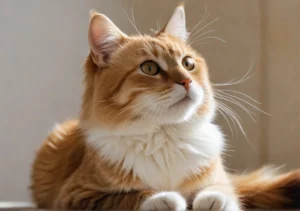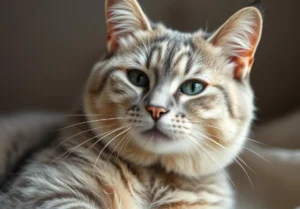Have you ever noticed that your cat seems to vibrate sometimes? It’s a strange sensation that can leave you wondering what exactly is going on. In this blog post, we’ll explore the reasons behind why your feline friend may feel like they’re vibrating and what you can do about it.
The Science Behind the Vibrations
If you’ve ever felt your cat vibrating, you’re not alone. This phenomenon can be quite common and is often linked to their unique physiology. One of the main reasons your cat may feel like it’s vibrating is due to purring. This instinctive behavior not only serves to communicate contentment but can also have a calming effect on the cat’s nervous system. The rapid vibrations created by purring can be felt as your feline friend snuggles up close to you.
Another factor to consider is muscle contractions. Cats have incredibly fast-twitch muscle fibers, which enable them to move quickly and with precision. These muscle contractions can sometimes be intense, leading to a subtle vibrating sensation that you may notice when petting your cat.
Additionally, your cat’s sensory perception may play a role in why it feels like they’re vibrating. Their acute senses allow them to pick up on the slightest movements and changes in their environment. This heightened awareness can manifest as a subtle vibration when they are especially alert or focused.
In essence, the vibrations you feel when petting your cat are likely a combination of purring, muscle contractions, and sensory sensitivity. Understanding these physiological factors can help you appreciate the unique ways in which your feline companion interacts with the world around them.
Health Concerns to Consider
While the vibrations your cat emits are often harmless, it’s essential to be aware of potential health issues that could be causing this sensation. Anxiety is a common culprit, as stressed cats may exhibit trembling or vibrating behavior in response to their emotional state. Creating a calm and soothing environment for your cat can help alleviate anxiety-related vibrations.
Another health concern to consider is hyperthyroidism. This condition, which affects the thyroid gland, can lead to increased metabolic rate and subsequent tremors or vibrations in your cat. If you suspect hyperthyroidism, consult your veterinarian for proper diagnosis and treatment options.
In some cases, neurological disorders may also be responsible for your cat’s vibrating behavior. Conditions such as epilepsy or nerve damage can manifest as tremors or shaking in cats. If you notice persistent or concerning vibrations in your cat, it’s crucial to seek veterinary guidance to rule out any underlying health issues.
By staying informed about potential health concerns and understanding the physiological reasons behind your cat’s vibrations, you can ensure the well-being and happiness of your feline companion. Remember to prioritize regular check-ups with your veterinarian to address any health issues promptly and provide the best possible care for your furry friend.
Environmental Factors
Hey there, if your cat feels like they’re vibrating, it could be due to a variety of environmental factors. Feline friends can get stressed out by changes in their surroundings, like loud noises or temperature shifts. Cats are sensitive creatures, so keep an eye out for anything that might be causing them distress. Make sure their environment is peaceful and comfortable to help reduce any vibrations you’re noticing.
Behavioral Insights
When it comes to your furry companion’s vibration levels, their behavior and emotions play a significant role. If your cat is content and relaxed, they might exhibit a slight purr that can feel like a gentle vibration. On the other hand, if your cat is feeling scared or anxious, they may tremble slightly with fear. Understanding your cat’s emotions can give you insights into why they might be vibrating. Plus, providing a safe and secure environment can help alleviate any stress they may be feeling.
- Is your cat vibrating out of excitement? Cats can get pretty animated when they’re having a good time. Just like a cheerful dance, their vibrations could be a sign of pure joy. Pay attention to their body language and vocalizations to gauge if they’re feeling happy and lively. And join in on the fun with some interactive playtime to keep the good vibes going!
Remember, each cat is unique, so getting to know your feline friend’s habits and behaviors can help you decipher why they might be vibrating. Trust your instincts and create a cozy, stress-free environment to keep your cat happy and healthy.
Tips for Soothing Your Cat
If your cat is vibrating, it may be experiencing stress or anxiety. To help calm your furry friend, create a safe space where it can retreat and feel secure. Providing comforting touches like gentle petting or using a calming pheromone diffuser can also help alleviate your cat’s vibrating sensation. If the vibrating persists or if you notice any other concerning symptoms, it’s essential to seek professional veterinary advice to ensure your cat’s well-being.
Understanding your Cat’s Unique Needs
Each cat is an individual with unique traits and preferences, so it’s crucial to observe and respond to your cat’s specific needs. Your cat may be vibrating for various reasons, such as excitement, fear, or even a medical condition. By paying attention to your cat’s body language and behaviors, you can better understand what triggers the vibrating sensation and tailor your responses accordingly. Remember, being attuned to your cat’s unique needs is key to maintaining a healthy and happy feline companion.
Additional Unique Insight : Cats may also vibrate when they are purring or kneading, which are natural behaviors that indicate relaxation and contentment. So, if your cat is vibrating while exhibiting these behaviors, it’s likely a sign of comfort and pleasure.
- Provide a safe space for your cat to retreat to when feeling overwhelmed.
- Comfort your cat with gentle touches and soothing tones to help reduce stress.
- Consider using a calming pheromone diffuser to promote relaxation in your cat’s environment.
Remember, your cat’s vibrating behavior is its way of communicating with you, so pay attention to its cues and respond with love and care. By understanding and addressing your cat’s unique needs, you can help create a harmonious and fulfilling relationship with your feline friend.
Why Does It Feel Like My Cat Is Vibrating?
If you’ve ever felt your cat vibrating while you pet them, don’t worry, you’re not imagining things. This phenomenon is actually quite common and can be attributed to a few different things. Cats have a unique sensory organ called the “pacinian corpuscles” located on their skin, which can cause them to vibrate when they experience intense emotions or pleasure. So, that vibrating sensation you feel is likely your cat’s way of showing you they’re happy and content.
Fun Facts About Cats
Purring Power : Cats don’t just purr when they’re happy; they also use it as a form of self-healing. The frequencies of a cat’s purr have been shown to promote healing and even reduce stress in both humans and other animals.
Whisker Wonders : A cat’s whiskers are more than just cute accessories – they serve as highly sensitive receptors that help them navigate their surroundings and sense changes in the environment.
Vertical Vision : Cats have incredible night vision thanks to their unique vertical-slit pupils. This adaptation allows them to see in low light conditions much better than humans.
Kneading Conundrum : Have you ever wondered why your cat kneads with their paws? This behavior stems from kittenhood, where kneading helped them stimulate milk flow while nursing from their mother.
By the end of this blog post, you’ll have a better understanding of why your cat may feel like they’re vibrating and how you can best care for your feline companion. Remember, a vibrating cat is usually a happy cat!
Alex, a passionate animal lover, has experience in training and understanding animal behavior. As a proud pet parent to two dogs and three cats, he founded AnimalReport.net to share insights from animal experts and expand his knowledge of the animal kingdom.




